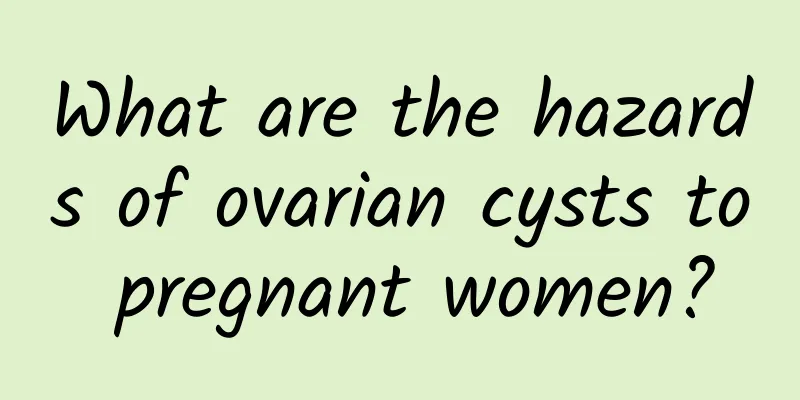Overview of modern research on recurrent spontaneous abortion

|
Recurrent spontaneous abortion is a heartbreaking event that has caused pain to many families. Recurrent spontaneous abortion is a common gynecological disease. Many experts have conducted research and discussions on it over the years, and there has been significant progress in academic exchanges. The following is an overview of modern research on recurrent spontaneous abortion. Recurrent miscarriage was once defined as three or more consecutive miscarriages. However, studies have shown that the risk of another miscarriage after two miscarriages is similar to that after three or more miscarriages, which are 30% and 33% respectively. Therefore, for those who have had two or more miscarriages, possible causes should be sought. Currently, recurrent miscarriage is defined as two or more consecutive miscarriages. Studies have found that recurrent miscarriage is mainly caused by the following reasons. 1. Genetic abnormalities Among couples with recurrent miscarriage, about 2% to 4% have one partner with a balanced chromosome reorganization, the most common of which is balanced chromosome ectopy, which will lead to duplication or deletion of chromosome fragments during meiotic chromosome separation, thus causing miscarriage; in addition, inversion is also the cause of a small number of recurrent miscarriages. In recent years, some people have used DNA analysis technology to find that highly distorted x chromosome inactivation is related to unexplained recurrent miscarriage, but this detection method has not yet been widely used. The chromosomes of both spouses are normal, but the karyotype of the aborted embryo itself is abnormal, which is also a cause of recurrent miscarriage. Recent studies have shown that 48% or more of the embryos of women with a history of recurrent miscarriage have chromosomal abnormalities. Repeated aneuploidy of embryos may be an important cause of recurrent miscarriage. 2. Hormone or metabolic abnormalities For a long time, luteal insufficiency (LPD) has been considered to be related to recurrent miscarriage, accounting for about 25%-40% of the causes of recurrent miscarriage. It is believed that when the corpus luteum is insufficiency, it cannot produce enough progesterone and thus cannot provide a mature endometrial layer for placental formation. However, in a controlled study conducted at the same time, the probability of LPD changes in the endometrium of normal women in a single menstrual cycle was about 50%; in continuous menstrual cycles, this proportion also reached 25%. An international multicenter study randomly divided 75 women into two groups, one group received a placebo, and the other group was immediately injected with hCG 10000IU intramuscularly upon diagnosis of pregnancy, and then 5000IU intramuscularly every week. There was no significant difference in the pregnancy success rate between the two groups (83%, 79%). Therefore, the relationship between LPD and recurrent miscarriage is still unclear. Polycystic ovary syndrome (PCOS) is considered to be an endocrine disease associated with recurrent miscarriage. Ultrasound examination found that 36% to 56% of women with recurrent miscarriage had polycystic ovaries (PCO). However, women with a history of recurrent miscarriage who are diagnosed with PCO by ultrasound alone have no difference in pregnancy outcomes from those without PCO. Elevated androgen levels have been shown to be associated with miscarriage. Women with poorly controlled type 1 diabetes have an increased miscarriage rate. However, there is no evidence that asymptomatic endocrine or metabolic disorders such as mild thyroid disease or impaired glucose tolerance cause recurrent miscarriage. 3. Uterine Anatomy Abnormalities Congenital uterine anomalies are most closely associated with mid-pregnancy miscarriage, and 10% to 15% of women with recurrent miscarriage in early pregnancy also have congenital uterine anomalies. Among them, the most closely related malformations include bicornuate uterus and uterus with septate, especially uterus with septate, which some people think may be due to the poor blood supply of the septum. Severe intrauterine adhesions and uterine exposure to diethylstilbestrol may also be related to miscarriage. There are still differences of understanding on the relationship between saddle uterus and submucosal fibroids and recurrent miscarriage. IV. Infection Factors Certain pathogens such as Listeria monocytogenes, Toxoplasma, and some viruses (such as rubella, herpes simplex, measles virus, cytomegalovirus, coxsackie virus) are considered to be related to sporadic spontaneous abortion, but have not been found to be related to recurrent abortion. The relationship between cervical chlamydia and mycoplasma infection and recurrent abortion remains controversial. Some people have found that the positive rate of endometrial ureaplasma culture in women with a history of recurrent abortion is higher than that of normal people. It is speculated that endometrial mycoplasma infection may be the cause of recurrent abortion. However, the effect of treatment or not on pregnancy outcomes for those who are positive for cervical mycoplasma is still inconclusive. Bacterial vaginosis may be related to mid-pregnancy abortion. 5. Environmental factors, occupational factors and personal habits There is no obvious relationship between environmental factors and sporadic miscarriage, and occupational exposure to certain substances such as organic solvents rarely causes sporadic miscarriage; exercise does not increase the miscarriage rate; the relationship between smoking, drinking and taking coffee and sporadic miscarriage is still controversial, and their effects may be dose-related, or they may work synergistically to increase the miscarriage rate; but the above factors have not been found to be related to recurrent miscarriage. |
<<: How to treat women's habitual miscarriage
>>: What are the latest treatments for miscarriage?
Recommend
Treatment options for patients with chronic adnexitis
Chronic adnexitis has a long course and a long tr...
What causes dysmenorrhea in women?
What causes dysmenorrhea in women? Dysmenorrhea i...
Can't stop talking? 10 Tips to Control Your Appetite
When it comes to diet, crazy weight loss or overe...
My metabolism is too bad. I gain weight by drinking water and my face looks pale! Chinese medicine doctor: Drink this tea to lose weight and improve your complexion
Many people have small stomachs and do not eat mu...
Can I drink motherwort granules during menstruation?
You can drink Motherwort granules during menstrua...
What are the dangers of threatened abortion?
What are the harmful manifestations of threatened...
Pay strict attention to the specific nursing work of dysmenorrhea
Effective dysmenorrhea care is crucial for the tr...
Nourishing Medicinal Diet Suitable for Patients with Ectopic Pregnancy
Ectopic pregnancy is one of the gynecological eme...
What abnormal conditions may occur in women after abortion?
Although abortion surgery is relatively simple to...
A brief analysis of common precautions for the treatment of vulvar leukoplakia
The precautions for treating vulvar leukoplakia a...
Can exercise treat bacterial vaginosis?
In daily life, gynecological diseases have always...
What are the commonly used folk remedies for treating amenorrhea?
Amenorrhea refers to a woman who is over 18 years...
What are the specific symptoms of early ovarian cysts?
What are the early symptoms of ovarian cysts? Ova...
Can Chlamydia Cervicitis Be Cured?
Chlamydia and mycoplasma are very small microorga...
What tests should be done for irregular menstruation
Irregular menstruation is a common gynecological ...









